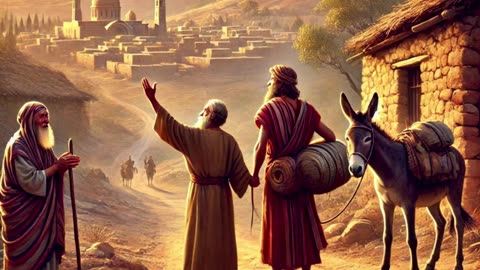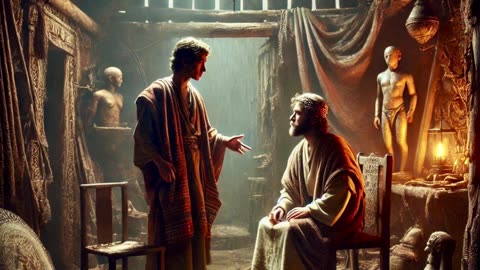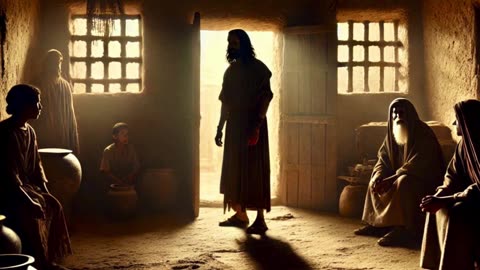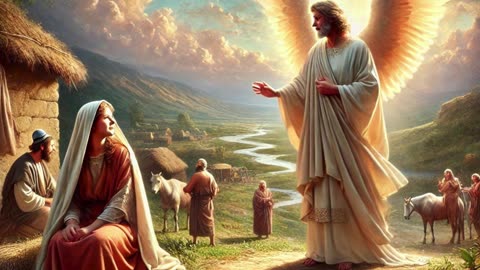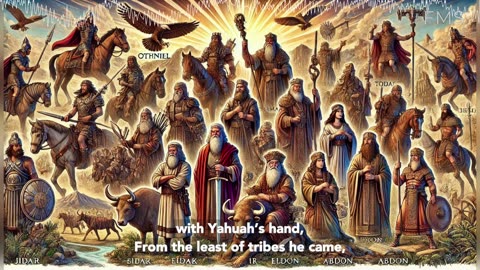
-
"Judges: Yahuah's Deliverers" #song #judges #faith #Bible #history #Yahuah #scripture #leadership
ssovereigndaudThis song takes us through the Book of Judges, highlighting the flawed yet faithful leaders Yahuah raised to guide Israel. Spanning approximately 300 to 350 years, from the death of Joshua to the establishment of the monarchy, this era saw Yahuah's deliverers rise to save Israel from oppression and lead them back to His ways. From Othniel to Samson, each judge played a crucial role in these tumultuous times. Their stories remind us of the importance of listening to Yahuah's guidance, learning from past mistakes, and striving to live righteously. Ultimately, this period winds up with Israel desiring to be like other nations, asking for a king to rule over them. Join us in this musical journey as we recount the victories, struggles, and lessons from the era of the judges, brought to life through the power of Yahuah’s hand. Verse 1: After Moses came and gone, the judges rose to bring us along,They were flawed, human like we, showing what to do and not to be.Othniel, Caleb's kin, stood strong, bringing Yisharal out of the wrong.Ehud, the left-handed warrior, struck down the oppressor, bringing honor. Verse 2: Deborah, a prophetess wise, with Barak, watched their foes' demise.Jael's hand with a tent peg, sealed the fate of Yisharal's dread.Gideon, with his small band, brought victory with Yahuah’s hand,From the least of tribes he came, in Yahuah’s name, he won the fame. Verse 3: Jephthah, though his vow brought pain, delivered Yisharal once again.Samson, strong yet led astray, found redemption on his final day.In cycles of sin, they cried out, Yahuah's mercy came about,Raising judges to lead the way, to bring His people back to His way. Verse 4: Tola and Jair judged the land, in peace they ruled by Yahuah's plan.Ibzan, Elon, Abdon too, guided Yisharal with wisdom true.Though flawed and human, they were called, through them Yahuah's power enthralled,To teach us lessons from their days, to walk in Yahuah’s righteous ways. Verse 5: Whether like Joshua, born in faith, or like Caleb, grafted in grace,Together they reached the promised place, through Yahuah’s guidance and embrace.Let us learn from their rise and fall, heed Yahuah’s voice, His call,With humility and hearts sincere, walk with Yahuah, hold Him dear. Outro: Yahuah, our strength and guide, through judges You did provide,In times of trouble, You were near, with Your wisdom, we persevere.From the days of old to now, we seek Your face, to You we bow,Guide us in Your Way, Yahuah, keep us.39 views -
Judges 21 The Aftermath of Civil War: Restoration and Irony
ssovereigndaudJudges 21 explores the aftermath of the devastating civil war between the tribes of Israel and the tribe of Benjamin. In this chapter, we witness the Israelites grappling with the consequences of their oath not to give their daughters to the Benjamites, leading to desperate and morally complex solutions to preserve the tribe of Benjamin. Key Points: * The Oath at Mizpah: The men of Israel had sworn not to give their daughters to the Benjamites, creating a significant dilemma after the near annihilation of Benjamin. * Weeping and Seeking Yahuah: The Israelites mourn before Yahuah, questioning why one of their tribes should be missing and seeking divine guidance. * Violent Solution: To provide wives for the surviving Benjamites, the Israelites attack Jabesh Gilead, sparing only 400 virgin women. * Festival at Shiloh: When the 400 women are insufficient, the elders devise a plan involving the festival at Shiloh, where the Benjamites are instructed to capture women during the dances. * Complex Morality: The chapter highlights the complex and often morally ambiguous decisions made by the Israelites, reflecting their struggle to uphold their oaths while preserving their tribal unity. * Irony and Legacy: The irony of Benjamin, the "son of the right hand," being associated with left-handed warriors, underscores the tribe's unique and multifaceted legacy. Reflection: Judges 21 serves as a poignant conclusion to the book of Judges, illustrating the consequences of rash vows, the complexities of justice and survival, and the ongoing need for divine guidance. The chapter emphasizes the importance of unity and repentance, highlighting how far the Israelites had strayed from Yahuah's commandments. Bonus Insight: Just over 400 years before this tragic conflict, Benjamin, the youngest son of Jacob and Rachel, was favored by Joseph, who filled his plate five times fuller than his brothers' (Genesis 43:34). Rachel tragically died giving birth to Benjamin (Genesis 35:18-19). Despite this favor and familial bond, the tribe of Benjamin faced near eradication due to actions far removed from Yahuah's commandments. Benjamin barely survived his birth, and his mother, Rachel, was not buried in the tomb of the patriarchs. This might have been due to her stealing Laban's idols (Genesis 31:19), or another reason that will be revealed when Yahusha returns. Discussion Topic: The Treatment of Women: Then vs. Now Historical Context: In ancient Israel, women had limited autonomy and were often treated as property or pawns in political and social arrangements. Marriages were typically arranged by male relatives, and women had little say in these decisions. * Judges 21 Example: The capture and forced marriage of the women of Shiloh to the Benjamites illustrates the lack of agency women had in their own lives. The Israelite elders' plan to solve the marriage crisis for Benjamin shows a pragmatic but ethically troubling approach to fulfilling their oath while ensuring the tribe's survival. * Modern Perspective: Today, in most cultures, women have significantly more rights and autonomy. They can choose their partners, pursue careers, and have legal protections against forced marriage and gender-based violence. The shift reflects broader societal changes towards gender equality and human rights. * Reflection and Discussion: How do the actions and attitudes towards women in Judges 21 contrast with contemporary values? What can we learn from these historical narratives about the progress and ongoing challenges in gender equality? The Curse to Eve and Its Implications: Genesis 3:16: After the fall, Yahuah said to Eve, "Your desire will be for your husband, and he will rule over you." This statement has been interpreted as the origin of the patriarchal structure in many societies, including ancient Israel. The subordination and limited autonomy of women seen in Judges 21 could be viewed as a continuation of this dynamic. Discussion Point: Reflect on how the consequences of the fall in Genesis might have influenced the social structures and treatment of women in biblical times. How have interpretations of this passage evolved, and what impact do they have on modern views of gender equality?72 views -
Judges 19 The Tragic Tale of the Levite and His Concubine
ssovereigndaudIn Judges 19, we encounter is one of the most harrowing and morally complex narratives of the scriptures. The chapter begins with a Levite from the hill country of Ephraim and his concubine, who has left him and returned to her father's home in Bethlehem, Judah. After four months, the Levite goes to persuade her to return with him. Her father welcomes the Levite with hospitality, and they stay for several days. As they journey back late one day, they decide to stay in the town of Gibeah in the territory of Benjamin. An old man offers them shelter, but that night, the men of Gibeah surround the house, demanding to abuse the Levite. In a tragic and disturbing turn, the host offers his virgin daughter and the Levite's concubine to the mob. The concubine is brutally abused throughout the night and dies on the doorstep. The Levite, upon discovering her death, takes her body home, dismembers it, and sends the parts to all the tribes of Israel to incite outrage and action against the men of Gibeah. This act sparks a civil war against the tribe of Benjamin, nearly leading to its annihilation. The narrative underscores themes of hospitality, societal decay, and the dire consequences of moral corruption in ancient Israel. Image Details: The image depicts the Levite and his concubine traveling on a dusty road towards Bethlehem. The concubine's father, an elderly man, stands outside a modest house, waving goodbye. The Levite, dressed in traditional ancient Hebrew attire, leads a donkey carrying their belongings. The setting sun casts a warm glow over the landscape, with the town of Bethlehem visible in the distance, featuring simple, stone-built structures typical of ancient Israelite architecture. Concubine's Role and Status: * Similar to a Wife: A concubine in ancient Israel had a status similar to that of a wife but with fewer rights and a lower social standing. The reference to her father as the Levite's father-in-law suggests a recognized familial relationship, emphasizing her role in the household. * Affair and Departure: The concubine's unfaithfulness and subsequent return to her father's house indicate a breakdown in the relationship. In the cultural context, this could imply neglect or dissatisfaction, but the text does not provide specific details about her motives. Cultural Treatment of Women: * Differing Standards: Women in ancient times often had limited autonomy and were subject to the authority of their fathers or husbands. The treatment and expectations of women were significantly different from modern Western standards. The concubine's actions and the responses of the men around her reflect these societal norms. * Examples from Scripture: Leah, who felt unloved by Jacob, serves as a contrast. She remained faithful despite her circumstances, using mandrakes as a means to gain her husband's attention and affection (Genesis 30:14-16). Reconciliation and Redemption: * Levite's Actions: The Levite's journey to bring his concubine back shows an attempt at reconciliation, indicating a willingness to forgive and restore the relationship. This act could be seen as a reflection of the cultural and personal dynamics at play. * Father's Hospitality: The concubine's father welcomed the Levite, possibly indicating his approval of their reconciliation or his love for his daughter. The repeated hospitality suggests he valued their presence and may have been ensuring their relationship was stable before they left. Parallel to Sodom and Lot: * Hospitality and Hostility: The events in Gibeah mirror those in Sodom, highlighting themes of hospitality, protection of guests, and the extreme wickedness of the townspeople. This parallel serves to underscore the moral decay and lawlessness in Israel at the time. * Consequences: The tragic outcome of the concubine's death and the subsequent civil war nearly led to the annihilation of the tribe of Benjamin. This illustrates the severe consequences of moral and social breakdown. Speculative Motivations: * Speculation on Motivations: The motivations of the concubine, her father, and the Levite are not explicitly detailed in the text. The father's hospitality could stem from love for his daughter or concern for their marital stability. The Levite's decision to leave late in the day could be seen as unwise, leading to the catastrophic events in Gibeah.73 views -
"Judges 17: "From Micah's Idols to Modern Magick: The Evolution of Personal Shrines and Aleister Crowley’s Influence on Culture"
ssovereigndaudThis exploration delves into the intriguing parallels between the biblical narrative of Judges 17 and contemporary practices of witchcraft and sorcery, reinterpreted through Aleister Crowley's philosophical lens. In Judges 17, we encounter Micah, who creates his own religious artifacts and appoints his private priest, illustrating early instances of personalized religious practices that deviate from centralized worship. Similarly, modern witchcraft, notably influenced by Crowley's Thelema, emphasizes personal sovereignty and the creation of individual spiritual paths, which can include personalized rituals and magickal practices. Aleister Crowley's impact extends into the heart of popular culture, where his philosophy of self-sovereignty and "Do what thou wilt" have resonated with artists and musicians like Led Zeppelin's Jimmy Page. These cultural icons have woven esoteric concepts into their works, subtly shifting cultural perceptions away from traditional religious doctrines towards more self-centric spiritual ideologies. This narrative reflects a broader human inclination to create personal sanctuaries of belief that diverge from mainstream religious teachings, often leading to a fragmented understanding of spirituality. The biblical warning, "my people are destroyed for lack of knowledge," resonates deeply here, highlighting the consequences of abandoning collective wisdom and divine guidance in favor of personal interpretations and practices. This piece examines the enduring tension between established religious authority and individual spiritual exploration and discusses the societal implications of these practices for contemporary spiritual communities. Through comparative analysis, this discussion provides insights into the historical and cultural continuities in human approaches to divinity and morality. It questions whether these personalized practices contribute to spiritual enrichment or ethical fragmentation, especially as influential figures continue to champion self-oriented paths, potentially leading to a lack of knowledge that the biblical text warns against.53 views -
Judges 16 "The Fall of Samson: Betrayal and Redemption"
ssovereigndaudJudges 16 delivers the dramatic climax of Samson's life story, marking both his greatest failure and his ultimate redemption. This chapter recounts how Samson, the last of the major judges of Israel, succumbs to the allure of Delilah, leading to his betrayal and capture by the Philistines. Despite his divine strength, granted through his Nazirite vow to Yahuah, Samson's vulnerabilities are exposed through his romantic entanglements, which ultimately strip him of his powers. In a poignant end, blinded and humiliated, Samson calls upon Yahuah one last time, leading to a catastrophic destruction that claims his life and those of his captors. This chapter serves as a profound reflection on themes of trust, deception, and the human capacity for redemption, urging readers to consider the consequences of their choices and the possibility of grace even in the darkest moments. Lesson Highlights: 1. The Universality of Betrayal:Betrayal is a universal theme that affects everyone, regardless of time or place. The stories of biblical figures like Samson, Eve, and Jacob serve as powerful mirrors to our own lives, revealing deep lessons about trust, deception, and personal growth. 2. Complexity of Human Emotions and Relationships:Samson's story illustrates the complexity of human emotions and the different ways individuals might interpret his actions—whether as a cautionary tale against naivety or as a tragic love story that highlights the vulnerabilities inherent in deep emotional connections. 3. Consequences of Our Actions:Our interactions and the trust we place in others have profound consequences, both personally and spiritually. The biblical narratives remind us of the divine perspective on our actions, emphasizing that Yahuah is forgiving but also expects us to learn and grow from our experiences. 4. Call to Integrity:The stories encourage us to be different by being trustworthy, caring, and loving—qualities that not only align with spiritual teachings but also enhance our lives and the community around us. Striving for integrity helps build a community where trust and love prevail over deception and betrayal. 5. Wisdom and Discernment:Facing life's challenges, especially those posed by 'predators' or deceptive individuals, requires wisdom and discernment. These qualities, emphasized in biblical teachings, are crucial for protecting oneself and navigating complex social interactions effectively. 6. Resilience and Hope:Despite challenges and setbacks, maintaining a strong moral compass and staying vigilant can lead to effective navigation through life’s trials, learning from past mistakes while moving forward with hope and integrity.38 views -
Judges 15 "Unilateral Decisions in a Warlord's Realm: Samson Saga and the Role of a Father-in-Law"
ssovereigndaudDescription: Dive into the turbulent times of ancient Israel, where tribal factions and the absence of a central authority bred an environment ripe for both conflict and legendary tales. This detailed exploration brings into focus the intriguing figure of Samson, a man of unparalleled strength and complex personal relationships, particularly highlighting the pivotal decisions made by his father-in-law that set off a chain of cataclysmic events. In a critical turn of events, Samson's father-in-law makes the unilateral decision to give his daughter, Samson’s wife, to another man, mistakenly believing that Samson had abandoned her. This decision not only betrays Samson’s trust but also sparks his wrath in a manner that brings devastating consequences to the Philistines. Employing his cunning, Samson crafts a retaliation involving 300 foxes, setting ablaze the Philistine's fields and vineyards, showcasing his tactical ingenuity akin to a biblical MacGyver. As the story unfolds, we see the disastrous impacts of these decisions ripple through the land—culminating in Samson’s grim yet heroic battle where he slays a thousand men with the jawbone of a donkey. The narrative intertwines personal vendettas with tribal warfare, illuminating how individual decisions in leadership can lead to widespread destruction and turmoil. This exploration seeks to understand the dynamics of power and consequence in a time when every leader was a law unto themselves, and how Samson's legendary feats were as much a response to personal betrayal as they were a reflection of the chaotic governance of his time. Join us as we delve into the depths of these ancient stories, uncovering lessons about leadership, vengeance, and the heavy costs of unilateral decisions.42 views -
Judges 14 Samson, the Philistines, and the Notion of Spiritual Lineage
ssovereigndaudSamson and his interactions with the Philistines provide rich material for exploring themes of love, betrayal, spiritual lineage, and redemption. These narratives, particularly in Judges 14 and John 8, challenge us to consider the nature of spiritual allegiances and their impact on human behavior. Samson and the Philistines: A Case Study in Divine Plans and Human Actions Samson’s life, as chronicled in the Book of Judges, is marked by extraordinary feats and personal failings. Born to a previously barren woman, Samson was designated as a Nazirite from birth, set apart for Yahuah’s service with specific prohibitions to guide his conduct. His interactions with the Philistines, including various women, highlight the complexities of his divine mission juxtaposed against his personal desires. Cultural Conditioning and Strategic Relationships Samson’s romantic entanglements with Philistine women, as described in Judges 14, can be seen through the lens of cultural conditioning where these women possibly viewed relationships as strategic tools within a patriarchal and tribal conflict. For example, Samson’s Philistine wife in Timnah was coerced by her people to betray him, illustrating how personal relationships were intertwined with broader socio-political maneuvers. The notion that these women might have been raised to use their beauty as a weapon, employing allure and intimacy to extract political and military advantages, adds depth to our understanding of these biblical accounts. Such dynamics underscore a recurring theme: the use of personal relationships as extensions of political agendas. Spiritual Lineage and Its Implications John 8:44 provides a profound commentary on spiritual lineage, where Yahusha confronts the Pharisees, accusing them of being the children of the devil. Yahusha’s rebuke centered on their actions and intentions, which reflected deceit and opposition to the truth, characteristics attributed to the devil. Incapacity for Love This discussion of spiritual lineage introduces the notion that those aligned with such negative forces might be "incapacitated" in their ability to love truly. Human Free Will and Redemption In the context of Samson, his story could have unfolded differently had he recognized and learned from the patterns of betrayal and manipulation in his relationships. Each encounter with the Philistines could have served as a lesson in discernment and fidelity to his Nazirite vow. Conclusion Samson’s narrative, along with the Pharisees’ confrontation with Yahusha in John 8, invites us to reflect on the broader implications of our spiritual allegiances and how they manifest in our actions. These stories challenge us to examine our own lives for instances where we might be letting lesser impulses dictate our actions at the expense of higher moral and spiritual goals. The biblical accounts encourage a deeper exploration of how our spiritual lineage—defined by our choices and allegiances—shapes our capacity to love, act justly, and pursue truth. In this light, redemption is not only a divine offer but also a personal choice, requiring active acceptance and a sincere commitment to transformation.52 views -
Judges 13 "Samson's Roots: The Birth of a Judge"
ssovereigndaudImagine you’re just a regular couple, Manoah and his wife, living a quiet life in ancient Israel. Your daily routine is suddenly interrupted when a celestial visitor, a messenger from Yahuah, appears unexpectedly. Instead of the usual village gossip, you're given a divine announcement: you’ll soon be parents to a boy destined to begin the deliverance of Israel from the Philistines. Now, you’d think the initial shock of seeing an angel would be enough, but then, as he ascends to heaven in the flames of your offering, the reality really sets in. Manoah panics, convinced that this supernatural encounter spells their doom, exclaiming, “We’re going to die!” But, with a calmer head, his wife reassures him, pointing out that Yahuah wouldn’t reveal such plans and then end their lives prematurely. "Samson's Roots: The Birth of a Judge" humorously explores how this extraordinary announcement disrupts the mundane lives of Manoah and his wife. From the awe-inspiring appearance of the angel to the comical yet human reaction of thinking they might die from the experience, this story is a delightful blend of divine prophecy and human reaction. Follow the journey of Manoah’s family as they prepare for the arrival of Samson, a child promised to be no ordinary boy, bound by a Nazirite vow from birth—meaning, among other things, no haircuts, ever! This episode sets the stage for the epic saga of one of the most powerful figures in biblical lore, weaving humor into the profound narrative of destiny and divine purpose.34 views -
JUDGES 12 "Echoes of Shibboleth: Linguistic Tests from Ancient Times to Modern Days"
ssovereigndaudIn Judges 12, a simple word becomes a powerful tool of identity verification, illustrating the enduring impact of linguistic nuances. The Gileadites used the word "Shibboleth" to distinguish friend from foe, exploiting a subtle pronunciation difference that the Ephraimites could not replicate. This ancient test, based on the inability to pronounce the "sh" sound, resulted in dire consequences for those who failed. Fast forward roughly 3,000 years, and we still observe similar linguistic challenges across the globe. Asian speakers often grapple with the English "r" sound, turning "rabbit" into "wabbit," while Russians might stumble over the "th" sound, transforming "this" into "dis." Similarly, native English speakers frequently struggle with the guttural "g" in languages like Spanish and Arabic, or the rolling "r" found in Spanish and Italian. These modern examples reflect the same linguistic phenomena seen in Judges 12 — the idea that language not only communicates but also divides, serving as a marker of cultural and regional identity. This historical continuity reminds us of the power of speech and accent as tools for social identification and, at times, exclusion. The story of Shibboleth invites us to reflect on the broader implications of our linguistic abilities and challenges, highlighting how something as natural as speech can shape societies and define boundaries, then and now. Conclusion: The narrative from Judges 12 not only provides a compelling story from ancient scripture but also connects deeply with contemporary issues of language and identity. It underscores how language serves as a profound element of cultural identity and can act as a barrier as much as a bridge, a concept as relevant today as it was thousands of years ago.48 views -
JUDGES 11 The Transformative Power of a Vow: A Personal Journey
ssovereigndaudTwenty-eight years ago, I faced a pivotal moment that would redefine my life's path. Inspired by a deep sense of responsibility and a desire to forge a healthier future, I made a solemn vow to Yahuah. This decision was sparked by profound personal loss—my father had succumbed to lung cancer, a fate tied directly to his smoking. This loss was not just personal; it carried a legacy of pain and absence, leaving a void where paternal guidance should have been. As I looked into the eyes of my own son, I understood that my actions would shape his world and his future. The cycle of loss and health compromised by smoking had to end with me. On Thanksgiving Day, after our meal, I committed to never smoke again. I was determined, no matter the challenge, no matter the cravings that might ensue, to uphold this vow. Miraculously, once the vow was made, the anticipated struggle dissolved. I never craved another cigarette. It was as if making the vow with a true and earnest heart called upon divine assistance, making the journey away from addiction not only possible but free from the struggle I had feared. This story isn't just about quitting smoking; it's about the power of vows made with sincerity and spiritual conviction. It's a testament to the idea that when we align our actions with our deepest values and commit wholeheartedly to change, the path forward can be supported by forces greater than ourselves. Through this experience, I learned the true strength of spiritual commitment and the profound impact of our choices not only on our lives but also on those we love. It stands as a reminder to all of us about the potential of vows to transform lives and to usher in a legacy of health, presence, and care for those who follow. Transition from Personal Insight to Jephthah’s Tale After sharing a personal journey of a vow made with deep conviction and positive results, we turn to a story from ancient times that serves as a cautionary tale about the consequences of hasty promises. In the biblical Book of Judges, Chapter 11 tells the story of Jephthah, a story that provides a stark contrast to the thoughtful vow just discussed. Jephthah's Rash Vow Jephthah, a skilled warrior and leader in Israel, faced significant pressure as he prepared to battle the Ammonites. In a moment charged with desperation and perhaps overzealous faith, Jephthah made a vow to Yahuah: If victorious over his enemies, he would offer as a burnt offering whatever first came out of the doors of his house upon his return. This vow, made without foresight or consideration of its potential consequences, led to tragedy when his only child, his beloved daughter, came out to greet him with jubilation upon his victorious return. Reflecting on the Nature of Vows This narrative starkly contrasts with the earlier personal story, where a vow made with clear intent and understanding led to a positive, transformative outcome. Jephthah’s story is a powerful reminder of the need for careful consideration when making commitments, especially those invoking profound consequences. Unlike the carefully considered vow to quit smoking, Jephthah's impulsive promise resulted in irreversible loss and sorrow. Lessons Learned Both stories together teach us about the power of our words and promises. While one illustrates the potential of vows to bring about positive change and divine support when made with sincerity and clear purpose, the other warns of the dangers of rash decisions, especially when made under pressure or without thoughtful consideration. Through these narratives, we are reminded that: * Vows carry weight, whether made to oneself, others, or the divine. * The context, intention, and content of our promises can dramatically alter our lives and those of others. * We must weigh our capabilities and responsibilities carefully before making vows that might lead to outcomes beyond our control. Conclusion In comparing these two accounts, readers are encouraged to reflect on their own decisions and commitments. The stories urge us to approach our vows and promises with the wisdom and reflection they deserve, recognizing that how we choose to commit ourselves can have far-reaching implications on our lives and the lives of others.40 views 1 comment

